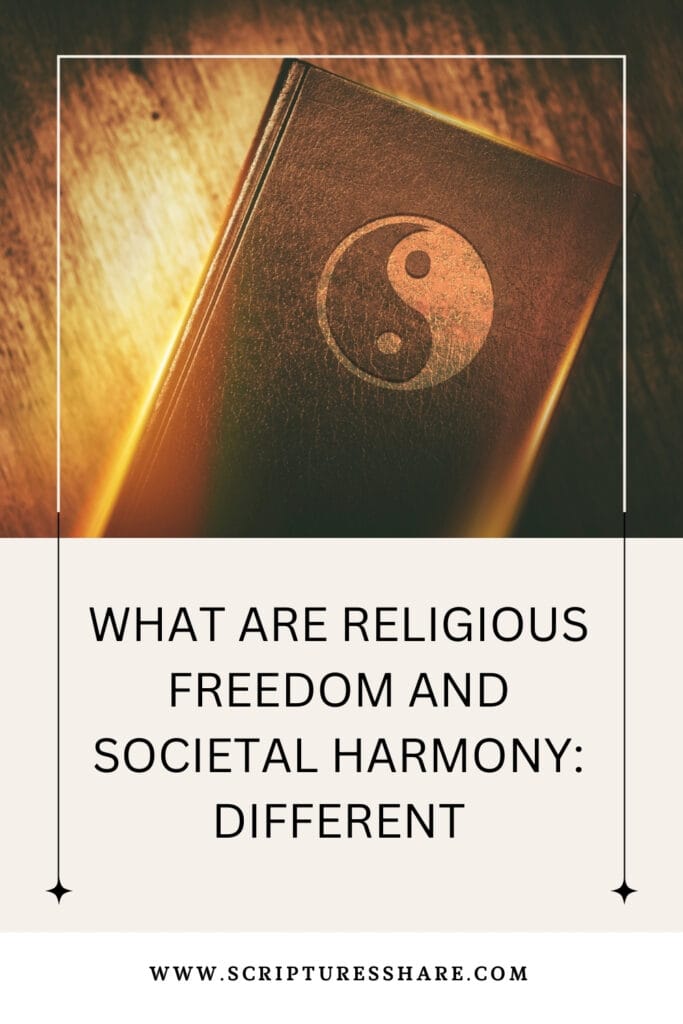No products in the cart.
What Are Religious Freedom and Societal Harmony: Different
This post contains paid and/or affiliate links. I make a small commission at no extra cost to you. Please see our Privacy Policy.
Religious freedom and societal harmony are key to a strong community. Our values and beliefs define us, and the right to practice our religion freely is a basic human right.
Respect for religious freedom brings people together. It creates a sense of unity, respect, and coexistence among people from different backgrounds.

Religious freedom has been important worldwide throughout history. In the Western world, it’s seen as a key to a healthy society. However, in many non-Western societies, especially in Asia.
Understanding how religious freedom and societal harmony relate is key in our global world.
The Pew Research Center’s studies show the complex relationship between religious freedom and societal harmony. Their Government Restrictions Index (GRI) and Social Hostilities Index (SHI) categorize countries based on religious freedom and societal hostility. This data reveals big differences between Western and Asian countries in government restrictions and social hostilities.
Let’s explore how religious freedom affects societal harmony. We’ll look at the values that shape our societies. This is important for unity and coexistence in our changing world.

Government Restrictions on Religion
The Pew Research Center’s Government Restrictions Index (GRI) for 2019 shows different levels of government restrictions on religion in Western and Asian countries.
In Western countries, like the United States, no country had “Very High” restrictions. Most, 27 out of 33, were classified as “Moderate.”
But, 11 Asian countries had “Very High” restrictions. This shows how Western and Asian countries handle religious freedom differently.
Variation in Government Restrictions
Looking beyond “Very High,” we see less difference. Most Western countries, including the United States, were “Moderate.”
Three European Union countries had “High” restrictions. Six Asian countries and 27 Western countries were “Moderate.” This shows a big variation in restrictions between regions.
ADVERTISEMENT
This data shows how governments worldwide approach religious freedom differently.

Social Hostilities Involving Religion
The Pew Research Center’s Social Hostilities Index (SHI) for 2019 gives insights into religious freedom and social hostilities. It shows how religion affects harmony in Western and Asian countries.
No Western countries had “Very High” social hostilities involving religion. But three Asian countries did. However, the difference is less at lower levels.
Social Hostilities Index (SHI) Classification:
- Most Western countries were classified as “Moderate” or “Low.”
- Six Western countries were classified as “High.”
- Ten Asian countries were classified as “Low.”
- Eight Asian countries were classified as “Moderate.”
These findings show the varying levels of social hostilities involving religion in Western and Asian countries. They highlight the complex relationship between religious freedom and societal harmony.

Religious Freedom and Inter-Religious Peace
The Pew Research Center’s data shows the best mix of the Low Government Restrictions Index (GRI) and the Low social Hostilities Index (SHI). This mix is key to understanding how religious freedom and inter-religious peace go hand in hand. This perfect blend is rare but can be found in both Western and Asian countries.
Western countries:
- Croatia
- Malta
- Liechtenstein
- Slovenia
- Estonia
- Portugal
Asian countries:
- Hong Kong
- Taiwan
- Timor-Leste
- Japan
Also, if we relax our criteria a bit, more countries fit the bill. This includes countries like Mongolia, Papua New Guinea, and Cambodia. Western countries like Canada, Ireland, and Australia also make the list.
This shows that both Western and Asian countries can work towards a balance of religious freedom and inter-religious peace. By supporting individual rights and promoting tolerance, these regions can create a positive cycle of religious freedom and inter-religious peace.
Conclusion
The link between religious freedom and societal harmony is complex. The Pew Research Center’s data shows that both Western and Asian countries can achieve this ideal balance.
Governments, religious leaders, and individuals must collaborate to achieve this. They must promote coexistence and respect for religious diversity. The data teaches us the importance of social norms, religious literacy, and principled engagement.
Advertisement. Scroll to continue reading.
By finding a balance between individual rights and societal interests, both the West and Asia can create a positive cycle. This will help build a cultural context that supports societal well-being and societal harmony.
FAQ
What is the relationship between religious freedom and societal harmony?
The connection between religious freedom and societal harmony is complex. Religious freedom allows people to practice their beliefs freely, which is vital for a healthy society. When religious freedom is respected, it promotes tolerance, understanding, and respect for different beliefs.
Do Western and Asian countries have different levels of government restrictions on religion?
Yes, the Pew Research Center’s Government Restrictions Index (GRI) for 2019 shows a difference. No Western countries had “Very High” restrictions, but 11 Asian countries did. However, at lower levels, the difference is less clear, with many Western countries having “Moderate” restrictions.
Are there significant differences in social hostilities involving religion among Western and Asian countries?
Yes, the Pew Research Center’s Social Hostilities Index (SHI) for 2019 shows interesting differences. No Western countries had “Very High” social hostilities, but three Asian countries did. Yet, the difference is less significant at lower levels.
Which countries exhibit the ideal combination of religious freedom and inter-religious peace?
The ideal mix of low GRI and SHI is rare but exists in Western and Asian countries. Western countries like Croatia, Malta, and Liechtenstein have it. Asian countries such as Hong Kong, Taiwan, and Japan also do.
What lessons can be learned from the Pew Research Center’s data?
The Pew Research Center’s data shows how key voluntary social norms and religious literacy are. They help ensure coexistence and respect for different religions. It’s clear we need ongoing efforts from governments, religious leaders, and people to build a society that values both religious freedom and harmony.













